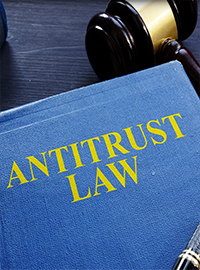| Sabre/Farelogix Merger: DOJ Antitrust Lawsuit Needlessly Threatens U.S. Prosperity and Innovation |
 |
|
By Timothy H. Lee
Thursday, January 23 2020 |
On Monday, January 27, trial will commence in the Department of Justice’s (DOJ’s) misguided antitrust lawsuit seeking to prohibit travel technology company Sabre’s acquisition of non-competitor software developer Farelogix. The DOJ’s action holds no merit in law or fact, and it illustrates how overzealous federal antitrust bureaucrats continue to impede American competitiveness and interrupt American consumers’ access to technological advancements. Today’s unprecedented levels of American prosperity, technological innovation and global preeminence amid a broader worldwide economic malaise reconfirm the potency of less regulation, lower taxes and fewer bureaucratic impediments for market innovators. One conspicuous realm of the federal government, however, continues to stand as an outlier and contravene today’s broader zeitgeist of reduced bureaucratic meddling in America’s economy: overzealous antitrust enforcement. That overzealousness threatens our continued prosperity and innovation with needless, misguided and often vindictive meddling. The DOJ’s faulty judgment is nothing new, of course. Writing in The Wall Street Journal recently, economist Thomas Hazlett recalled the folly of the federal government’s 2000 antitrust excess in “A Lesson for Today’s Tech Trustbusters.” "The AOL-Time Warner merger was going to dominate the internet,” Hazlett sarcastically observed, but “today both companies barely exist.” As Hazlett wryly noted, the AOL-Time/Warner folly was no isolated example: In 2005, the Bush Administration prevented Blockbuster from acquiring Hollywood Video on antitrust grounds: The merger would threaten to monopolize video rentals. Blockbuster filed for bankruptcy in 2010 and today has a single store, in Bend, Ore. It sounds like the plot for a movie, if Netflix is interested in making it. Ouch. The DOJ’s baseless opposition to the Sabre/Farelogix transaction provides the latest example of excessive and misguided antitrust enforcement. By way of background, acquiring company Sabre is one of three worldwide global distribution system (GDS) enterprises, which connect travel agencies with airlines and other transportation service companies. Specifically, Sabre links over 425,000 travel agents with approximately 400 different airlines, 175,000 hotels, 40 rental car agencies and other travel services. In contrast, Farelogix provides a complementary product, which it sells only to a small number of airlines. As Sabre and Farelogix cogently summarize in their pretrial brief, their product portfolios and customer relationships differ starkly: Sabre sells GDS services; Farelogix does not. Farelogix sells NDC API software and services; Sabre does not. Unlike Sabre’s GDS, which connects hundreds of thousands of travel agents to hundreds of thousands of travel suppliers and provides valuable services to and maintains commercial agreements with travel agencies, [Farelogix] can only be used by one airline to connect with one third party at a time. Farelogix has no commercial agreements with travel agencies. Accordingly, Sabre and Farelogix aren’t direct competitors, which makes the DOJ’s decision to oppose the acquisition agreement on antitrust grounds puzzling. In fact, in order to bring even a colorable claim under antitrust laws, the DOJ had to unfairly distort the relationship between Sabre and Farelogix. Specifically, as Sabre and Farelogix highlight in their pretrial brief, the DOJ attempts to contort a clearly vertical merger into a horizontal one: DOJ seeks to place these different products in the same “relevant market” because if it can transform this vertical transaction – i.e., a transaction where the merging parties sell products at different stages in the distribution chain – into a horizontal deal between competitors, DOJ can attempt to rely on market concentration figures to establish a presumption of competitive harm. But in vertical mergers, “unlike horizontal mergers, the government cannot use a shortcut to establish a presumption of anticompetitive effect through statistics about the change in market concentration, because vertical mergers produce no immediate change in the relevant market share.” Contrary to the DOJ’s assertion, Sabre doesn’t seek to eliminate Farelogix, but rather incorporate and improve its software product to provide a superior product to its airline and travel agent customers and the traveling public. As evidence of that reality, and further rebutting the DOJ’s “anticompetitive” claim, Sabre has committed to maintaining current pricing, service levels and investment levels for existing Farelogix products. Sabre has also committed to continue supporting any Farelogix contract for at least three years past current applicable expiration dates. That’s hardly the sort of behavior justifying a DOJ antitrust crusade. Making the DOJ’s effort even more alarming, Sabre’s Spanish competitor Amadeus is currently much larger and already possesses the type of technological capability that Sabre seeks to purchase from Farelogix. As most consumers know, the travel marketplace is a global one, not a merely domestic one as the DOJ seems to believe. Consequently, the DOJ’s antitrust overexuberance threatens an American company to the likely benefit of an overseas competitor. And on what basis? Hopefully, the DOJ recognizes that reality before additional judicial resources are wasted. Otherwise, American competitiveness and consumers, in addition to the involved parties, will suffer substantial harm due to the DOJ’s misplaced regulatory priorities. |
Related Articles : |

























